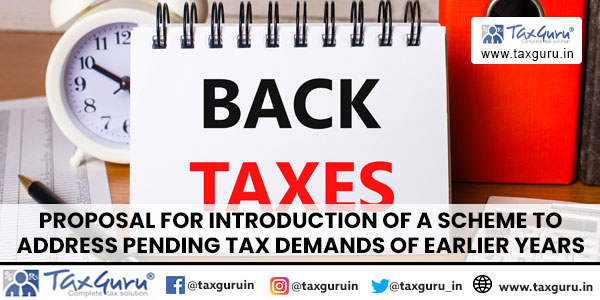Proposal for Introduction of a Scheme to Address Pending Tax Demands of Earlier Years
The Vivad Se Vishwas Scheme 2024, introduced by Hon’ble Finance Minister Nirmala Sitharaman in the Annual Budget 2024-25, is a commendable initiative aimed at streamlining the resolution of pending income tax disputes. The scheme is designed to reduce litigation burdens on taxpayers and tax authorities , ensuring a more efficient and timely revenue generation process for the Government.
Objective and Eligibility of Vivad Se Vishwas Scheme
The Vivad Se Vishwas Scheme has simplified the framework for resolving disputes concerning pending appeals. The eligibility criteria focus on taxpayers involved in disputes before:
- The Commissioner of Income Tax (Appeals) [CIT(A)],
- The Income Tax Appellate Tribunal (ITAT),
- High Courts or the Supreme Court,
- The Dispute Resolution Panel (DRP), including cases where final assessment orders are pending,
- Taxpayers awaiting final assessment orders from the Assessing Officer (AO) following DRP directions,
- Taxpayers with pending revision applications under Section 264 of the Income Tax Act.
From the above, it is evident that Vivad Se Vishwas Scheme 2024 is limited to taxpayers with pending appeals or cases in dispute.
Additionally, the recent CBDT order enables the remission or extinguishment of smaller tax demands up to INR 25,000 for the period up to FY 2009-10, and INR 10,000 for the period FY 2010-11 to FY 2014-15. This move is also highly appreciated, as it eases the burden of small demands that have accumulated over time.
Unaddressed Issue: Demands without Appeals or Extinguishment Criteria
While the Vivad Se Vishwas Scheme and the CBDT’s remission initiative are noteworthy, there is a significant group of taxpayers whose unresolved demands do not fall under either category. These demands often involve the following situations:
1. Non-Availability of Intimation Orders: There are cases where intimation orders are not available on the portal or with the jurisdictional Assessing Officer (JAO). Without access to these , taxpayers cannot ascertain the details of outstanding demands.
2. Time-Barred Demands: Some demands pertain to tax years for which the record-keeping period (6 years as per Section 44AA and Rule 6F) has expired. This prevents taxpayers from retrieving relevant records to support their claims or settle their dues.
3. Paid Demands Without Substantiating Records: Taxpayers who have paid their demands but cannot substantiate payments due to lost or inaccessible records find themselves burdened by ongoing interest and penalties.
4. Limited Access to Annual Information Statement (AIS): Since the AIS, introduced in 2021, only contains data from FY 2020-21 onwards, taxpayers are unable to access payment records for earlier years, complicating the verification of past tax liabilities.
These unresolved demands, compounded by the lack of necessary documentation, are causing considerable distress to taxpayers who are unable to resolve these issues.

Proposal: Scheme for Settling Demands without Pending Appeals
To address the concerns of taxpayers facing unresolved tax demands without pending appeals or eligibility for extinguishment, we propose the introduction of a separate scheme that would allow taxpayers to resolve these issues efficiently. The following framework is proposed for consideration:
- Scope: The scheme should cover demands that are not currently under appeal and do not meet the extinguishment criteria.
- Coverage of Time-Barred Records: The scheme should include demands for tax years where the record-maintenance period has expired. Given that the AIS only reflects data from FY 2020-21 onwards, provisions should be made for taxpayers facing unresolved demands for years prior to FY 2020-21, for which records may no longer be available.
- Relief Structure: Taxpayers should be allowed to settle only the principal amount of the demand, with a waiver of interest and penalties. This approach would alleviate the financial distress caused by accumulated interest and penalties over the years.
By implementing this scheme, the following benefits would accrue:
1. Mitigation of Financial Distress: Waiving interest and penalties would significantly ease the financial burden on taxpayers, enabling them to settle outstanding demands more equitably.
2. Clarity and Closure: This mechanism would provide clarity and a sense of closure to taxpayers burdened by long-standing, unresolved demands. They would be able to reconcile their tax records and move forward without prolonged uncertainty.
3. Encouragement of Compliance: A transparent and fair resolution process would improve taxpayer compliance and enhance trust in the tax administration, resulting in greater cooperation between the public and the government.
Conclusion
We believe that the introduction of such a scheme would not only alleviate the grievances of taxpayers but also further the government’s goal of simplifying tax compliance and reducing litigation. It would offer a fair and efficient resolution process that benefits both taxpayers and the government.
We strongly urge the government to consider this proposal and implement a mechanism for settling these unresolved demands. The scheme would ensure fairness, transparency, and improved trust in the tax system.
Recommendation
Taxpayers facing similar unresolved issues are encouraged to submit applications to the CBDT requesting the consideration of this proposed scheme for such demands. Their collective voice would strengthen the call for a more inclusive and effective resolution mechanism.
CA Pardeep Tayal
+91 9896092408
ptcppt@gmail.com
Co Author:-Ms. Shruti Banga





